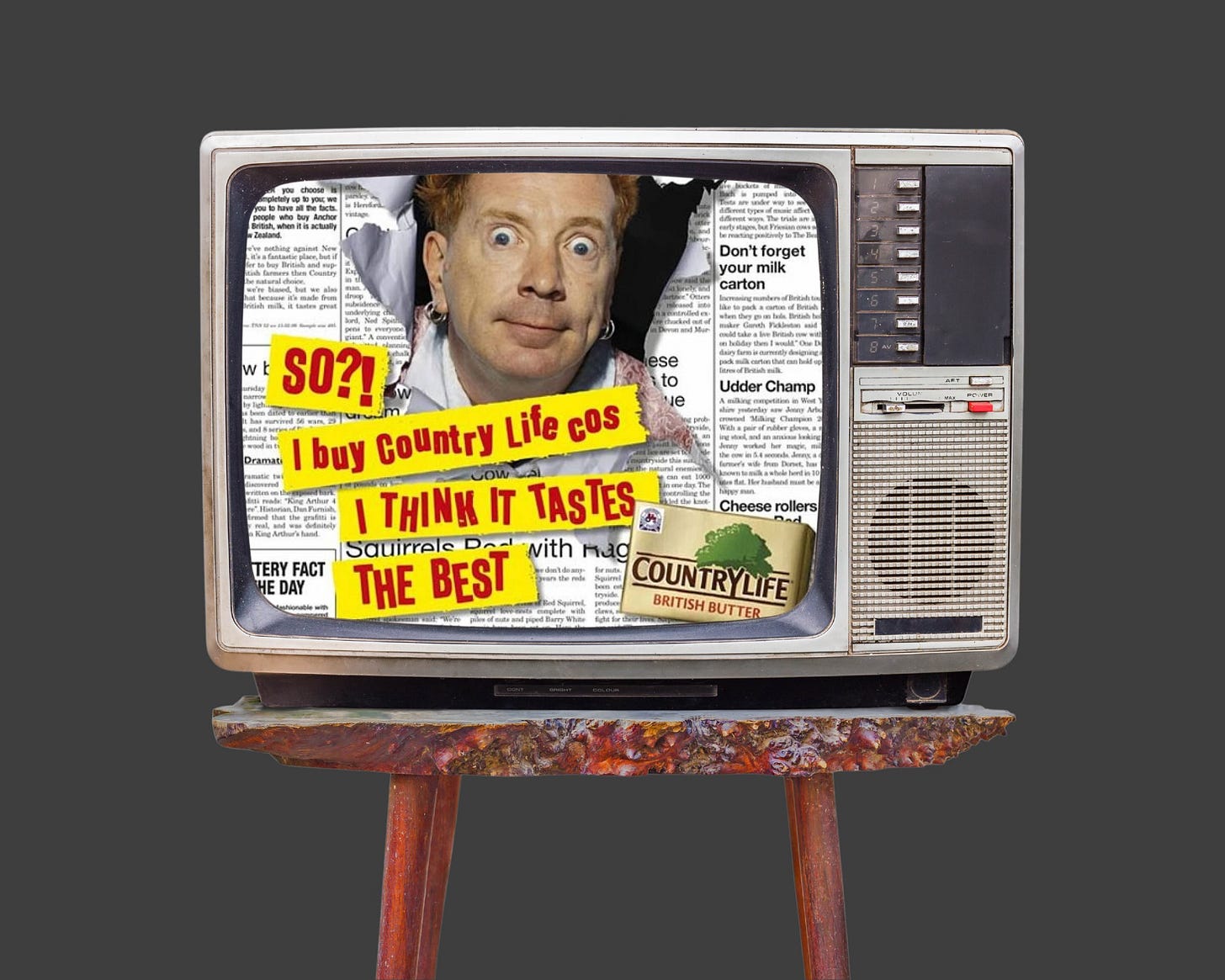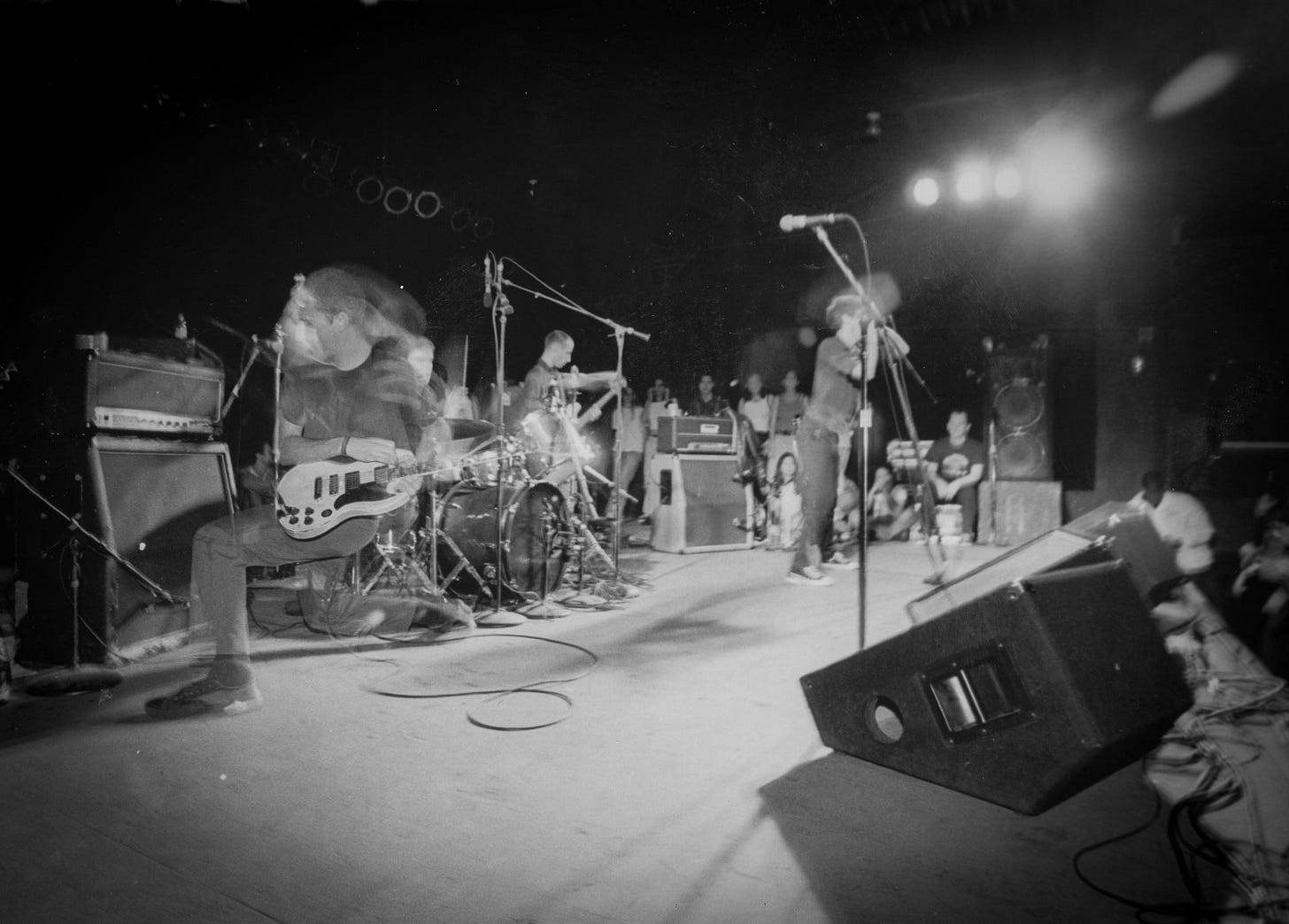So Much Staying Alive
There was a time when accusations of "selling out" could end even the most promising careers, but these days, the term has lost all its sting. That's not necessarily a bad thing.

I.
When I tell you that I overanalyzed and fucking agonized over this decision, I am not overstating the ordeal. It was 2002, five years after we’d broken up. Five years after we stumbled out of a major-label bidding war without that much-ballyhooed seven-figure record deal, sure, but personally and emotionally drained nonetheless. We spent a great deal of our short lifespan as a band perpetually worried that every decision we made was the “wrong” or “right” one—whether it was the musical direction of a song or the price of a t-shirt—but it felt like we were always using someone else’s measurements. As a band, we very rarely used the words “selling out” to describe such decisions in conversation, but let’s be honest: We were hardcore kids who came up in the late eighties. Of course we were concerned about the perception of selling out.
There were always so many small choices to make, like the time we turned down the chance to play a massive show in Washington D.C. with Quicksand and CIV because we’d already committed to play a 200-capacity show in New York with Garden Variety—and keeping our word, we decided, was clearly the righteous thing to do. (I still back that.) But there were also the more consequential and well-documented choices, like the way we very publicly signed a multi-album deal to Revelation Records in 1995 as a smug fuck-you to the major labels who wanted to sign us, only for them to shrug, undeterred, saying they’d be happy to buy us out of our contract anyway. (And in at least one case, that they’d be happy to buy Revelation outright if it meant having us.) The more popular we became, the more complicated these choices seemed to be, and this tension undoubtedly contributed to our inevitable implosion. Constantly having to calculate every decision you make according to a vague moral rubric can be exhausting for even the most well-meaning band of hardcore kids.
So when that email arrived five years later, presenting us with the opportunity to license one of our songs for a TV car commercial, so help me God, I was mortified. I could only stare blankly at the wall and treat the whole thing like a philosophical question—like, is it even selling out if you’re not actually a band anymore? Five years after we’d played our final note at a youth center in Bielefeld, Germany, I was still putting other people’s judgments in front of my own thoughts and needs, as if no time had passed at all.
II.
A few years ago, my friend Dan Ozzi put out a book whose premise partly rests on the observation that people just don’t care about selling out like they used to. That he was able to convince eleven fairly major bands, both active and disbanded, to come together under the umbrella of a book called Sellout speaks to this assertion. There was certainly a time when no one would have wanted to be caught dead next to that word, but today, the term “selling out” has lost almost all its sting. What happened?
For one thing, words like that, over time, lose their punch because they lose their meaning. Which is to say that as our community grew, and as our bands and other artists scaled along with that growth, it began to feel like the ever-expanding net of “selling out” was being used to absorb everything. Did your band sign to In-Effect? Sellout. Are you playing a club with barricades? Sellout. Did your third album feature midtempo songs and actual singing? Sellout. Does your record label use barcodes? Sellout. Did Converse give you free sneakers? Sellout. They sell your fanzine at Tower Records? Sellout. Well, OK, that last one happened to me in 1995, but still, the point is there: Barring a complete fealty to the idea of never doing anything that Fugazi didn’t do, we were all most likely doomed to go down for one thing or another.
By the early 2000s, though, and especially at around the same time that we were approached with the idea of doing that commercial, there seemed to be a cultural shift happening among the younger generation of kids. These were kids who, I realize now, grew up in an era where Green Day and the Offspring were literal rock stars and summer vacations meant going to the immensely popular (and unabashedly corporate-branded) Vans Warped Tour. These kids were wholly unbothered by the reality that even some of the more righteous hardcore indie labels had agreements with the Sony-owned RED and the Warner-owned ADA for distribution, much less so whenever a band signed with a major. They were also part of the Napster generation who grew up downloading countless gigabytes of free music, so they didn’t begrudge bands for getting paid in other ways—including brand partnerships and commercial and TV licensing. For a huge swath of young people, the old ways of talking about selling out had become archaic.
This early millennium version of punk was disconcerting to me, but I also didn’t feel like it was my place to call the shots anymore. The ways in which I expressed my “punkness” were unique to my lived experience; they were based on a very specific set of circumstances at a very specific point in time. This kind of laissez-faire, anything-seems-to-go permissiveness, however, reflected the new generation’s own lived experience. I still believed it was an over-correction at the time—I may have joked that we were paving our way into a bleak future of “Monster Energy Drink Sunday Matinees”—but admittedly, I also found something strangely liberating about the approach. It was like saying, “Hey. How about we all just like what we like and do what we do, and whenever anyone is seriously fucking up, we’ll let you know.” It wasn’t perfect by any means—and some truly awful things came out of it—but in spite of its failures and dissents, rejecting the idea of “selling out” as a harsh binary actually helped to reveal the failure of sellout ideology as a whole: It heralded the idea of a punk culture that honors individual agency and personal accountability over fear and social punishment.

III.
Touché Amoré came out of the next generation after that, which means that the sheer amount of choices that have been made available to them since forming in 2007—in the world after Fuse and Fall Out Boy—quite likely dwarf whatever I had gone through ten years earlier. Through it all, they’ve been widely viewed as one of our most thoughtful and ethical bands, and for singer Jeremy Bolm, that means putting a fine point on what his virtues are. In a 2020 interview for The Creative Independent, he put it in these terms: “If I’m able to survive financially and I’m able to be proud of the work that we’ve done—and didn’t compromise any of our integrity, which I don’t think we would ever do in any circumstance—that’s enough for me. Failure would be doing things that we’re not comfortable with and regretting them later.”
I was struck by this last note about failure for two reasons. First, because it places integrity as his primary measure of success, but more interestingly, because while “doing things that we’re not comfortable with” can certainly be seen as the first step towards a bad decision, it’s also known to be the first step towards learning and growth—traits that are vital to us, whether you’re a band or a human being. In advance of Touché Amoré’s upcoming sixth album, Spiral in a Straight Line, I spoke with Jeremy about this personal ideal, and he was quite frank about how, even under best intentions, he’s still made mistakes along the way.
“One time, when we were on tour with AFI, a shoe company—forgive me for not remembering which one—was like, ‘Hey. We’ll give you X amount of money to fly to Hamburg to play a super small show that will be free for your audience on this day,’” he recalls, for a conversation that will be published in full on Thursday. “We were like, ‘Yo! We’ll get paid, free flights, free accommodations, and play a show in Hamburg, and then rejoin the tour!’—because there happened to be a week off on the AFI tour where they were doing festivals and we were going to be stuck in the middle of nowhere. It felt so serendipitous, so we were like, ‘Let’s do it!’ But then we got there and it became very apparent that this was not advertised. Nobody knew we were even doing it. They were supposed to be giving away tickets at a record store that did not advertise that they had the tickets. At this point, we were doing pretty well in Germany. So for us, we thought this show would be a home run, a super small show in a town that we do well in, and it would be really rowdy because it was on a boat. But then we got there, and we had the horseshoe when we played—people weren’t even up front. We were playing mostly to staff members and maybe twelve people that were there because they knew who our band was. It was one of the most humiliating experiences, and that was one where it felt like we didn’t really think this one through.” He laughs, then adds, “I can’t blame us for taking that chance, but it made us realize we had to think a little deeper about this stuff.”
There are always multiple trains of thought that go into making any decision, and sometimes, of course, money plays a role. But over the last several years, I’ve started identifying myself as “an experience collector,” as someone who just wants to know what will follow from making certain decisions or who just wants to know what it feels like to turn left when I’ve always turned right. I’m not trying to purposely fuck up—I fuck up enough by accident, thank you very much—but I do also know that I’ve never really learned anything of value from not fucking up. If we want to experience growth in this community, it’s crucial that we cut ourselves some slack and give each other the permission to go experience success or defeat for ourselves. This is how we learn.
As Jeremy insists, “We all need a big slice of humble pie every now and again. It’s so important. So would I change those experiences? Fuck no.”
IV.
In the end, for a short period of time in Germany, a car commercial with one of our songs in it aired on television. It was, quite frankly, a non-event. The commercial itself just repurposed some footage from the moon landing, introduced a new car, and then managed to slip in ten seconds total of our song—without giving the viewer any sort of real clue as to what connects those three things in the first place. One YouTube commenter said, “Love Texas is the Reason, but this was definitely a horrible choice of music for the commercial,” and I’m inclined to agree. Another commenter, this time on Reddit, offered, “I wish bands would be in more car commercials lol. I remember reading that the Modest Mouse song in a car commercial netted them more money than their entire career up to that point.” This was also true for us. By a lot. But for the most part, no one really cared. Anyone who felt like we “sold out” said their piece and moved on with their lives. As did we.
I don’t regret this decision. That was not a given at the time that we made it. You can trust me when I say that I know all of the ethical arguments against licensing songs for commercial use, but—and I can only speak for myself here—I honestly just wanted to experience this for myself. It felt weird to get self-righteous about putting a song on television knowing how much I actually love watching television; it felt weird to get self-righteous about car companies, as if I never drive in cars. The person at the advertising agency was also a legitimate fan, a friend of a friend of our European booking agent, and that mattered to me. I did not believe I was better than them because they chose a more traditional job to survive. Staying alive is what we all have in common.
I wish I could give you more of a cautionary tale, like the one Jeremy gave, but the conclusion to my part of this story doesn’t end like that. In this story, one year after the commercial aired, I was hit by a tow truck in California and found myself unable to walk—and unable to work—for almost six months. My incredibly generous employer at the record store I managed offered to pay my rent until I could come back, but it was that commercial money, which I’d saved for a rainy day, that ultimately covered the rest of my debts and expenses until I was able to start generating an income again. Whatever you think of that commercial, I owe some part of my existence today to the fact that I made that decision the way I did in 2002. You can call it whatever you want, but those ten seconds of music kind of saved my life.
Coming on Thursday to Anti-Matter: A conversation with Jeremy Bolm of Touché Amoré.
Anti-Matter is an ad-free, anti-algorithm, completely reader-supported publication. If you’ve valued reading this and care to ensure its survival, please consider becoming a paid subscriber today. ✨






The absolutism was real, that's for sure. There was a Canadian band called My Dog Popper who wrote a song called "Rock Stars Are Assholes" and it was about...the Dead Kennedys. Because they wanted a guarantee. Which struck me as a little ridiculous even back then. And Brendan Canty, in Instrument, talking about how people would come up to him at Fugazi shows and ask him if it was true they lived without heat.
Today I'd never begrudge a band the ability to support themselves, especially since the deck is so stacked against making any actual money off of records. But...it's tough, because corporations will always be looking for ways to co-opt youth culture for a profit , and I think at least healthy skepticism is called for. Anymore I reserve the idea of "selling out" for bands who loudly insist that they aren't for sale. Like, if a group like Nausea or A.P.P.L.E. all of a sudden did a collab with with Nike or something like that, it'd be hard not to give them the side-eye. But that's sort of it.
When I was younger I was really obsessed with the comedian Bill Hicks like a lot of other teens in the early 1990s were. (He once said entertainers who did tv commercials were “sell outs” and off the “artistic roll call” if they did one as he put it) for some reason during that time period I thought that was really funny. But many years later I read an interview with john cassavetes who said, “young people think in terms of absolutes.” Which I think sums up why so many young people are so hung up on the concept of “selling out” (well even some elder statesmen like jello Biafra are still hung up on that idea going so far as calling Fugazi “sell outs” because dischord records are distributed by southern in England) I guess words and concepts don’t have fixed definitions.